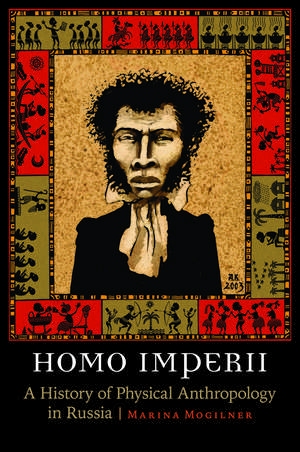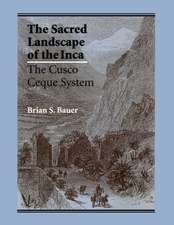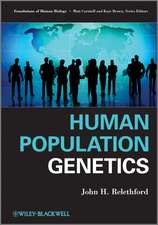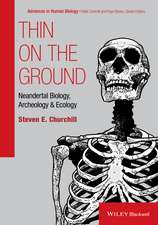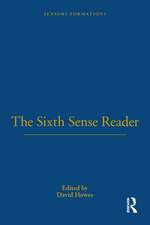Homo Imperii: A History of Physical Anthropology in Russia: Critical Studies in the History of Anthropology
Autor Marina Mogilneren Limba Engleză Hardback – iul 2013
Reminiscent of the work of anthropologists of empire such as Ann Stoler and Benedict Anderson, Homo Imperii reveals the complex imperial dynamics of Russian physical anthropology and contributes an important comparative perspective from which to understand the emergence of racial science in nineteenth- and twentieth-century Europe and America.
Din seria Critical Studies in the History of Anthropology
-
 Preț: 467.70 lei
Preț: 467.70 lei -
 Preț: 231.34 lei
Preț: 231.34 lei -
 Preț: 368.09 lei
Preț: 368.09 lei - 19%
 Preț: 511.74 lei
Preț: 511.74 lei -
 Preț: 297.15 lei
Preț: 297.15 lei -
 Preț: 217.53 lei
Preț: 217.53 lei -
 Preț: 143.86 lei
Preț: 143.86 lei - 23%
 Preț: 449.27 lei
Preț: 449.27 lei -
 Preț: 221.55 lei
Preț: 221.55 lei -
 Preț: 220.78 lei
Preț: 220.78 lei - 15%
 Preț: 456.93 lei
Preț: 456.93 lei -
 Preț: 235.22 lei
Preț: 235.22 lei -
 Preț: 226.43 lei
Preț: 226.43 lei -
 Preț: 219.68 lei
Preț: 219.68 lei -
 Preț: 426.41 lei
Preț: 426.41 lei -
 Preț: 217.95 lei
Preț: 217.95 lei -
 Preț: 208.87 lei
Preț: 208.87 lei -
 Preț: 469.61 lei
Preț: 469.61 lei -
 Preț: 361.36 lei
Preț: 361.36 lei -
 Preț: 316.70 lei
Preț: 316.70 lei -
 Preț: 508.71 lei
Preț: 508.71 lei -
 Preț: 464.44 lei
Preț: 464.44 lei -
 Preț: 479.24 lei
Preț: 479.24 lei -
 Preț: 256.70 lei
Preț: 256.70 lei -
 Preț: 394.77 lei
Preț: 394.77 lei -
 Preț: 432.95 lei
Preț: 432.95 lei - 23%
 Preț: 456.24 lei
Preț: 456.24 lei -
 Preț: 323.35 lei
Preț: 323.35 lei -
 Preț: 407.62 lei
Preț: 407.62 lei -
 Preț: 257.09 lei
Preț: 257.09 lei -
 Preț: 297.07 lei
Preț: 297.07 lei -
 Preț: 216.59 lei
Preț: 216.59 lei -
 Preț: 215.27 lei
Preț: 215.27 lei - 15%
 Preț: 488.94 lei
Preț: 488.94 lei - 15%
 Preț: 452.35 lei
Preț: 452.35 lei -
 Preț: 283.08 lei
Preț: 283.08 lei -
 Preț: 375.78 lei
Preț: 375.78 lei - 15%
 Preț: 464.65 lei
Preț: 464.65 lei
Preț: 516.19 lei
Preț vechi: 607.28 lei
-15% Nou
Puncte Express: 774
Preț estimativ în valută:
98.79€ • 102.75$ • 81.55£
98.79€ • 102.75$ • 81.55£
Carte tipărită la comandă
Livrare economică 15-29 aprilie
Preluare comenzi: 021 569.72.76
Specificații
ISBN-13: 9780803239784
ISBN-10: 0803239785
Pagini: 504
Ilustrații: 38 photographs, 4 illustrations, 4 maps
Dimensiuni: 152 x 229 x 43 mm
Greutate: 0.89 kg
Editura: Nebraska
Colecția University of Nebraska Press
Seria Critical Studies in the History of Anthropology
Locul publicării:United States
ISBN-10: 0803239785
Pagini: 504
Ilustrații: 38 photographs, 4 illustrations, 4 maps
Dimensiuni: 152 x 229 x 43 mm
Greutate: 0.89 kg
Editura: Nebraska
Colecția University of Nebraska Press
Seria Critical Studies in the History of Anthropology
Locul publicării:United States
Notă biografică
Marina Mogilner is the academic director at the Center for the Studies of Nationalism and Empire in Kazan, Russia, and coeditor of the international quarterly Ab Imperio. She is the author of several books, chapters, and articles on late imperial history in Russia.
Cuprins
List of Illustrations
Introduction: The Science of Imperial Modernity
Part 1. Paradoxes of Institutionalization
1. Academic Genealogy and Social Contexts of the “Atypical Science”
2. Anthropology as a “Regular Science”: Kafedra
3. Anthropology as a Network Science: Society
Part 2. The Liberal Anthropology of Imperial Diversity: Apolitical Politics
4. Aleksei Ivanovskii’s Anthropological Classification of the Family of “Racial Relatives”
5. “Russians” in the Language of Liberal Anthropology
6. Dmitrii Anuchin’s Liberal Anthropology
Part 3. Anthropology of Russian Imperial Nationalism
7. Ivan Sikorsky and His “Imperial Situation”
8. Academic Racism and “Russian National Science”
Part 4. Anthropology of Russian Multinationalism
9. The Space between “Empire” and “Nation”
10. “Jewish Physiognomy,” the “Jewish Question,” and Russian Race Science between Inclusion and Exclusion
11. A “Dysfunctional” Colonial Anthropology of Imperial Brains
Part 5. Russian Military Anthropology: From Army-as-Empire to Army-as-Nation
12. Military Mobilization of Diversity Studies
13. The Imperial Army through National Lenses
14. Nation Instead of Empire
Part 6. Race and Social Imagination
15. The Discovery of Population Politics and Sociobiological Discourses in Russia
16. Meticization as Modernization, or the Sociobiological Utopias of Ivan Ivanovich Pantiukhov
17. The Criminal Anthropology of Imperial Society
Conclusion: Did Russian Physical Anthropology Become Soviet?
Notes
Index
Recenzii
"This is a brave, well-written, and scholarly excavation of an important and contested episode in the history of Russian thought that highlights and begins to challenge some of the distortions of the intervening Soviet and post-socialist ideology and historiography."—Dominic Martin, Journal of the Royal Anthropological Institute
